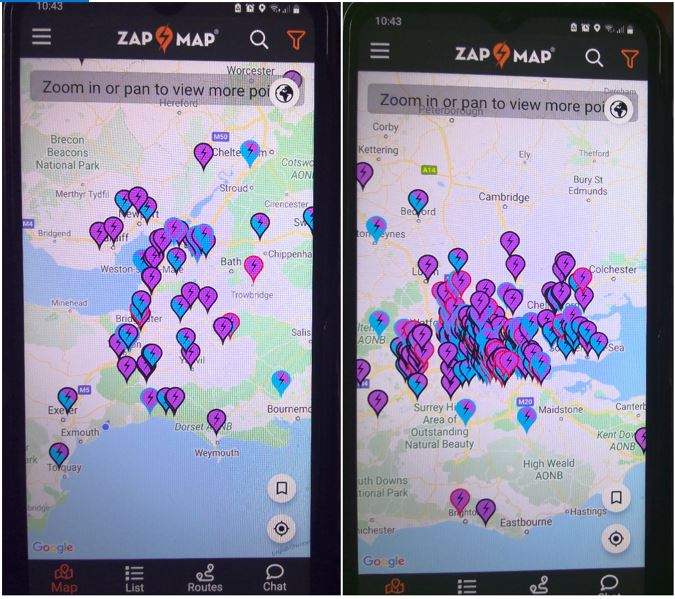“East Devon is very lacking in the high Kw fast chargers but the system will hopefully grow to keep up with the number of cars.”
.
Earlier this month, Ros Coward of the Guardian reported on a road-trip last summer in her new EV – and discovered Devon:
Problems are most visible on longer journeys. When lockdown was relaxed in May we booked to stay at Derek Gow’s rewilding project in Devon. We planned to stop where there were “clusters” of chargers but still got caught out, idling away an hour in a glum corner of Amesbury in Wiltshire, only to discover the charger had stopped working after 10 minutes.
After that, it was a hunt for other chargers in obscure garden centres, supermarkets and garages. Some worked, some did not, but we began to meet the community of electric adventurers, passing time waiting for chargers by comparing apps, prices and “worst EV journeys”.
Most places are willing to help out with charging. They were happy to sling a wire at Gow’s and on the way back, the Bull hotel in Bridport, Dorset – booked last minute – didn’t turn a hair, reserving us a place by an external charging point. “We’d better get used to this,” they said.
It is getting better, with promises of more charging points by the end of this year:
Here’s how Devon’s gearing up for an electric car revolution | News – Greatest Hits Radio (Devon)
In November, the Exeter City Council issued a press release pointing to a ‘new map’ showing the spread of charging points for electric cars in the county:
Electric Vehicle Charging Points expanding across Devon, new map reveals – Exeter City Council News
The map being recommended is the ‘zap map’:
Charging points and electric vehicles UK 2021 – Zap Map
However, as a correspondent points out, if the zap map of London is compared to that of Devon, things are a little different:
“This shows the locations of chargers in the range 50 to 350kW and the paucity of them in Devon, Dorset and Somerset compared to London and home counties. As with Broadband we are losing out in our little corner… “

And with further comment on the VGS Facebook pages:
It will be much better if the separate companies would all decide to do away with individual apps and cards and just utilise contactless bank cards. I don’t doubt that the day will come but the sooner the better.
East Devon is very lacking in the high Kw fast chargers but the system will hopefully grow to keep up with the number of cars. I have wondered how folk who travel many miles a day manage but they will have developed their own strategies no doubt.
The best thing is to plan your journey ahead and ensure you know the locations of chargers or have something like Zap Map on your phone.
We can only look forward to better electric vehicle charging infrastructure in these parts.
That’s because, in the UK, on the Continent and in the Far East, EVs are becoming an accepted part of the landscape – including the political landscape – according to the FT in October:
This extraordinary surge in demand is being felt right across the world, from Shanghai to Stuttgart, Tokyo to Toronto, and from new brands to the established giants of the industry. It is particularly acute in Europe. One in 12 cars sold across the continent between April and June this year ran on batteries alone. If hybrid models that use both an engine and a battery are counted, this rises to one in three. Sales of electric cars in Europe have jumped from 198,000 in 2018 to an expected 1.17m this year… Given the importance of auto manufacturing to many economies, the shake-up that is starting to convulse the industry has enormous implications for jobs, urban development and even geopolitics.
Electric vehicles: the revolution is finally here | Financial Times
In December 2021, sales of electric vehicles overtook sales of diesel cars for the first time in Europe, as 176,000 EVs rolled out of car dealerships across the continent. At the same time in China, the country’s automotive industry announced that EV sales for the year had ballooned by 158 percent compared with 2020, as more than 3.5 million vehicles took to the roads. These sales figures were not a blip. In Europe, EVs made up an estimated 14 percent of all new vehicles sold in 2021, according to the banking and financial services company ING. In China, it was 9 percent…
The US Refuses to Fall in Love With Electric Cars | WIRED UK
Meanwhile in the US, the market is much weaker:
Why Won’t The US Embrace EVs? – CleanTechnica
But in the States, the whole business of e-cars is being driven by… business… and politics:
Lawyer For Big Oil Tells Court That Lawsuits Threaten National Security – CleanTechnica
With this report today from Arkansas:
.